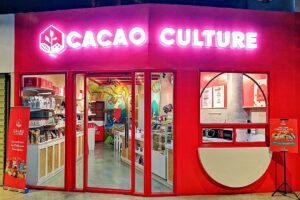By Adrian H. Halili, Reporter
DAVAO-BASED chocolate brand Cacao Culture said it is taking a “farm adoption” approach to supporting farmers in the region and growing its bean-sourcing network.
“We’re not trying to be the biggest. We want to be (possibly be) the most collaborative,” Kenneth Reyes-Lao, founder and owner of Cacao Culture, told BusinessWorld.
Mr. Reyes-Lao and his family currently own a three-hectare cacao farm in Calinan, Davao City. It also supplements its cacao supply from small-holder farmers and cooperatives in Davao City.
He said that one of Cacao Culture’s long-term plans is to further expand its sourcing from the area.
“We need to grow the supply side which is the farms. So, through the Adopt-a-Farm program, we’re hoping to, under our care, manage around 20,000 to 50,000 trees,” he added.
“On other farms, there are trees that are unproductive or neglected. So, we move in to manage the farm, and then also be the ones to take up the beans. We’ll be buying from the farms that we adopt,” he said.
The company started in 2016 selling cacao seedlings, while the farm was established in 2017.
Mr. Reyes-Lao said that the business has since evolved from agriculture to selling chocolate products both made in-house or by other brands. It sells its products at its physical store in Davao and via e-commerce platforms.
“When we started in 2017, it was just the three hectares we planted, and then lately we realized that we were growing and the company needed supply,” he said. “Then we saw an opportunity to adopt a certain farm where we could apply our practices.”
“So far, this has worked (and) right now we have two farms under the program,” he added.
Among Cacao Culture Farms’ practices is the use of biochar in the growing process. This method enhances soil health and improves plant growth and crop nutrition.
He said that the husks of discarded cacao pods are burned and reused as biocharcoal.
“We were able to work with WasteX, a Singapore-based startup, that… provides equipment that can convert agricultural waste into biocharcoal,” Mr. Reyes-Lao added.
He said that the farm employs a 50-50 ratio of biocharcoal and traditional fertilizer.
Mr. Reyes-Lao added that its other sustainability practice is avoiding the use of plastic sleeves to cover cacao pods.
Cacao pods are typically covered in plastic sleeves to protect them from pests like cocoa pod borers, which lay eggs in the pods.
Additionally, he said that the company is looking to expand its physical store network over the next three to five years, mainly focusing on the Davao area.
“The land area of Davao is large, so we maybe need to create three to five shops just to service Davao City. Then maybe airports in Cagayan de Oro or Cebu,” he added.
Mr. Reyes-Lao said that expansion to Luzon will likely be pursued through e-commerce platforms or a commissary to service Metro Manila.
“We could set up a commissary or warehouses, because e-commerce wise, I think we can expand in Manila,” he added.
The Davao Region is the Philippines’ top producer of cacao, accounting for about 80% of the total production.
